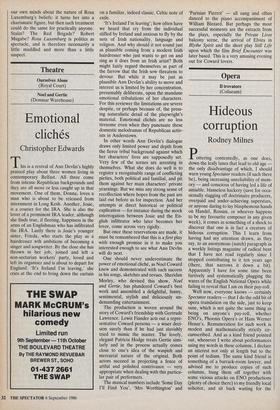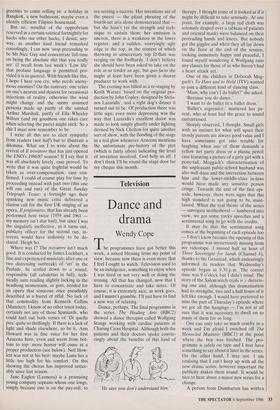Opera
11 trovatore (Coliseum)
Hideous corruption
Rodney Milnes
Pottering contentedly, as one does, down the leafy lanes that lead to old age the only disadvantage of which, I should warn young Spectator readers (if such there be), being increasing unreliability of mem- ory — and conscious of having led a life of amiable, blameless hackery (save for occa- sionally slagging off doctrinaire producers, overpaid and under-achieving superstars, or anyone daring to lay blasphemous hands on Handel, Rossini, or whoever happens to be my favourite composer in any given week), it comes as something of a shock to discover that one is in fact a creature of hideous corruption. This I learn from having had my attention drawn, as they say, to an anonymous (natch) paragraph in a weekly listings magazine of radical bent that I have not read regularly since I stopped contributing to it ten years ago (there, that narrows it down a bit). Apparently I have for some time been furtively and systematically plugging the wares of the English National Opera while failing to reveal that I am on their pay-roll.
Well now, everyone knows — certainly Spectator readers — that I do the odd bit of opera translation on the side, just to keep sane, which is not quite the same thing as being on anyone's pay-roll, whether ENO's, Phoenix Opera's or Hans Werner Henze's. Remuneration for such work is modest and mathematically strictly cir- cumscribed. And as a kind friend pointed out, whenever I write about performances using my words in these columns, I declare an interest not only at length but to the point of tedium. The same kind friend is something of a barrack-room lawyer, and advised me to produce copies of such columns, bung them off together with some vicious attacks on ENO productions (plenty of choice there) to my friendly local solicitor, and sit back waiting for the greenies to come rolling in: a holiday in Bangkok, a new bathroom, maybe even a silently efficient Filipino housemaid.
But no, mindful of the opprobrium reserved in a certain satirical fortnightly for hacks who sue other hacks, I desist; any- way, as another kind friend remarked consolingly, I can now 'stop pretending to be Mr Nice Guy and concentrate full-time on being the absolute shit that you really are' (I recall from last week's 'Low life' that profane language is permitted pro- vided it is in quotes). With friends like this, I hope I hear you cry, who needs anony- mous enemies? On the contrary: one relies on one's nearest and dearest for occasional injections of reality, otherwise the wind might change and the sunny assumed persona made up partly of the sainted Arthur Marshall, partly of Ella Wheeler Wilcox (and my goodness one takes care when selecting the parts) might stick. So a shit I must now remember to be.
I write all this not to elicit sympathy from readers (not half) but to illustrate a dilemma. What am I to write about the revival of II trovatore that has just opened the ENO's 1986/87 season? If I say that it was all absolutely lovely, case proved. To write that it was quite frightful would be taken as over-compensation, case con- firmed. I could of course play for time by proceeding instead with part two (this one will run and run) of the Great Sunday Telegraph Tease: a fortnight ago their spanking new music critic delivered a clarion call for the first UK staging of an opera, II prigioniero, that has already been performed here twice (1959 and 1961 my memory isn't that bad), but since I was the singularly ineffective, as it turns out, publicity officer for the second run, in- terests would have tediously to be de- clared. Heigh ho.
Where was I? The trovatore isn't much good. It is conducted by James Lockhart, a fine and experienced musician; after one or two distressing outbreaks of 'art' in the Prelude, he settled down to a sound, responsible (all cabalettas in full), tech- nically sure reading slightly lacking in the headlong momentum, or guts, needed for an opera that someone once pseudishly described as a barrel of offal. No lack of that commodity from Kenneth Collins (Manrico): I know of no other tenor today, certainly not any of those Spaniards, who could hurl out both verses of 'Di quella pira' quite so thrillingly. If there is a lack of light and shade elsewhere, so be it. Ann Howard was in fine voice for her first Azucena here, even and warm from bot- tom to top: more horror will come in a proper production (see below). Neil How- lett was not at his best: maybe Luna lies a little too high for his comfort. On this showing the chorus has improved notice- ably since last season.
Jane Eaglen (Leonora) is a promising young company soprano whom one longs, simply because one is on the pay-roll, to
see scoring a success. Her intentions are of the purest — the pliant phrasing of the fourth-act aria alone demonstrated that but she hasn't yet the strength and tech- nique to sustain them: her emission is uneven, there is a weakness in the lower register, and a sudden, worryingly ugly edge at the top, in the context of which throwing in unnecessary top D-flats was verging on the foolhardy. I don't believe she should have been asked to take on the role at so tender an age, but quo facto she might at least have been given a decent producer to work with.
The evening was billed as a re-staging by Keith Warner 'based on the original pro- duction by John Copley, designed by Stefa- nos Lazaridis', and a right dog's dinner it turned out to be. Of production there was little sign; even more depressing was the way that Lazaridis's excellent decor was made to look simply ghastly under lighting devised by Nick Chelton for quite another sort of show, with the flooding of the stage in a red glow whenever Azucena mentions the unfortunate pre-history of the plot (which is fairly often) indicating the level of invention involved. God help us all. I don't think I'll be round the stage door for my cheque this month.







































 Previous page
Previous page